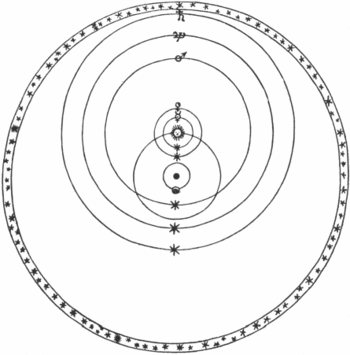Tychonic system: Difference between revisions
Jump to navigation
Jump to search

imported>Joe Quick m (subpages) |
imported>David E. Volk m (typos) |
||
| Line 1: | Line 1: | ||
{{subpages}} | {{subpages}} | ||
[[Image:Tychonic Universe.gif|right|thumb|350px|{{#ifexist:Template:Tychonic Universe.gif/credit|{{Tychonic Universe.gif/credit}}<br/>|}}The Tychonic Universe. The black point at centre is the Earth, rounded by Sun and Moon. Otherwise, the Sun is rounded by five | [[Image:Tychonic Universe.gif|right|thumb|350px|{{#ifexist:Template:Tychonic Universe.gif/credit|{{Tychonic Universe.gif/credit}}<br/>|}}The Tychonic Universe. The black point at centre is the Earth, rounded by Sun and Moon. Otherwise, the Sun is rounded by five orbits, marked with the planet's symbols. From: Tycho Brahe, ''De mundi aetherei recentioribus phaenomenis''. Uranibourg, 1599.]] | ||
The '''Tychonic Sysyem''' or '''Tychonic Universe''' is the model of universe developed by the observational astronomer [[Tycho Brahe]] in response to astronomical and cosmological | The '''Tychonic Sysyem''' or '''Tychonic Universe''' is the model of universe developed by the observational astronomer [[Tycho Brahe]] in response to astronomical and cosmological discussions that took place in his time. His model incorporates many of the geometrical advantages of the [[Copernican System]] (specially the movement of [[inner planets]]) without the [[Physics|physical]] and [[Cosmology|cosmological]] problems that came from it - in particular, the problems of a moving [[Earth]]. | ||
In his model, the Sun place | In his model, the Sun place is the centre of the [[orbit]]s of five [[planet]]s ([[Mercury]], [[Venus]], [[Mars]], [[Jupiter]], and [[Saturn]]) and the Earth remains static, being the centre of the [[Sun|Sun's]] and the [[Moon|Moon's]] orbits. Above all, remains the cristaline [[stellar sphere]]. | ||
Revision as of 13:12, 9 March 2008
The Tychonic Sysyem or Tychonic Universe is the model of universe developed by the observational astronomer Tycho Brahe in response to astronomical and cosmological discussions that took place in his time. His model incorporates many of the geometrical advantages of the Copernican System (specially the movement of inner planets) without the physical and cosmological problems that came from it - in particular, the problems of a moving Earth.
In his model, the Sun place is the centre of the orbits of five planets (Mercury, Venus, Mars, Jupiter, and Saturn) and the Earth remains static, being the centre of the Sun's and the Moon's orbits. Above all, remains the cristaline stellar sphere.
